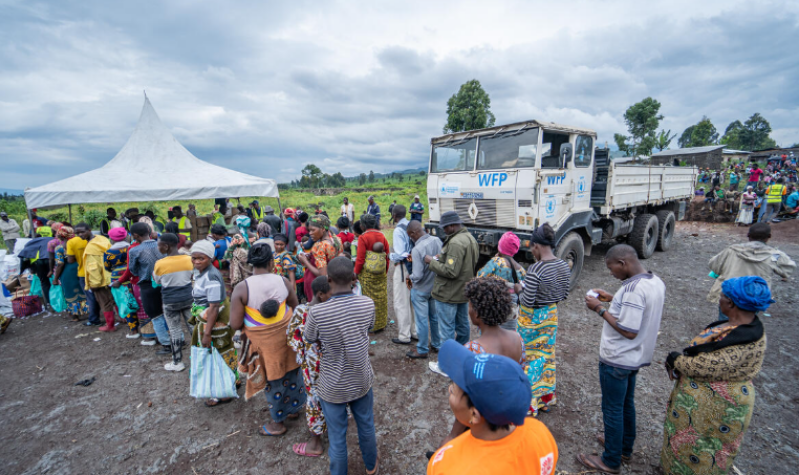
Reports of targeted attacks against Christian communities and the persistent destabilizing influence of armed groups have led to urgent debates within the European Parliament and renewed commitments from the EU to support peace and security in the region.
Addressing the European Parliament plenary, European Commission Vice President Kaja Kallas highlighted the ongoing conflicts and the "unacceptable offensive of the M23 armed group supported by Rwanda." While noting a potential decrease in the intensity of this particular conflict and hopes that "a ceasefire and credible peace process can be relaunched", Kallas emphasized that the overall violence in eastern DRC has not stopped.
Kallas acknowledged that the region is afflicted by numerous armed groups who have inflicted deadly violence responsible for serious human rights violations, but she singled out the Allied Democratic Forces (ADF), which is affiliated with the Islamic State.
"This group has in the past claimed attacks against Christian communities because of their faith," said Kallas. "But they target all civilians with killings, kidnappings and looting."
In 2023, ADF was the armed group responsible for the highest number of killings in the DRC, with over 1,000 victims, according to the U.N. Joint Human Rights Office in the DRC. In the second half of 2024 alone, ADF was responsible for over 650 civilian deaths across North Kivu and Ituri.
In a motion for a resolution titled, "Targeted attacks against Christians in the Democratic Republic of the Congo: Defending Religious Freedom and Security," the European Parliament underscored the Commission's concerns, noting reports that the ADF "has reportedly carried out continued indiscriminate attacks against civilians in North Kivu and Ituri Provinces, on occasion targeting churches and religious leaders."
While acknowledging that such violence impacts all communities, the resolution points out that "most victims have been Christian, belonging to the religious majority" in a country where 95 percent of the population is Christian.
The European Union, stated the resolution, has pursued diplomatic interventions and deterrent measures such as sanctions targeting individuals and entities responsible for serious human rights violations and abuses. The EU parliament welcomed the "Council’s decision on 17 March 2025 to impose restrictive measures on nine individuals and one entity responsible for acts that constitute serious human rights violations and abuses in the DRC and for sustaining the armed conflict, instability and insecurity in the DRC and exploiting the armed conflict through the illicit exploitation or trade of natural resources."
The resolution also echoed concerns by the UN Group of Experts, which estimated that between 3,000 and 4,000 Rwandan army troops are in DRC territory and "considers that the deployment of the Rwanda Defence Force violates the sovereignty and territorial integrity of the DRC, and that Rwanda’s de facto control and direction over M23 operations also renders Rwanda liable for the actions of M23."
Consequently, the European Parliament called on the Commission to suspend the EU-Rwanda Memorandum of Understanding on sustainable raw materials value chains, put a halt on any plans to support any mining projects in Rwanda and a trade embargo on all minerals imported from Rwanda into the EU. Additionally, the resolution proposed an export ban on weapons from the EU to Rwanda and suspension of any further military and security assistance to Rwanda "until the territorial integrity of the DRC is restored."
These measures, added the resolution, "complement existing United Nations sanctions" and aim to "strengthen DRC’s security and law enforcement apparatus so that they can better protect the population, including against armed groups." Additionally, the EU said it is actively engaged in initiatives that help tackle extremism and hate speech, support for the local and regional conflict mediation initiatives and measures to improve the resilience of populations in eastern DRC.
The EU parliament called for a quick resumption of negotiations within the Luanda Process to find a lasting, peaceful and political solution and urged all sides to fully honour their engagements within the Luanda Process. The EU was called upon to "have an active role in the diplomatic efforts to de-escalate the conflict, advocating for an immediate ceasefire and a renewed commitment to dialogue, with the protection of civilians at the core of negotiations, in particular women and children."
The ongoing fighting and shelling, particularly around Goma, have severely limited the delivery of humanitarian aid to those in need. The resolution called on all neighboring countries, especially Rwanda, to facilitate access for humanitarian equipment and personnel to rebel-held areas, including reopening of Goma airport and borders.
"I think it is important that all the violations and abuses are really investigated," said Kallas, “not just for the sake of justice but also to address the long-term drivers of instability and insecurity across the DRC and the region.”





